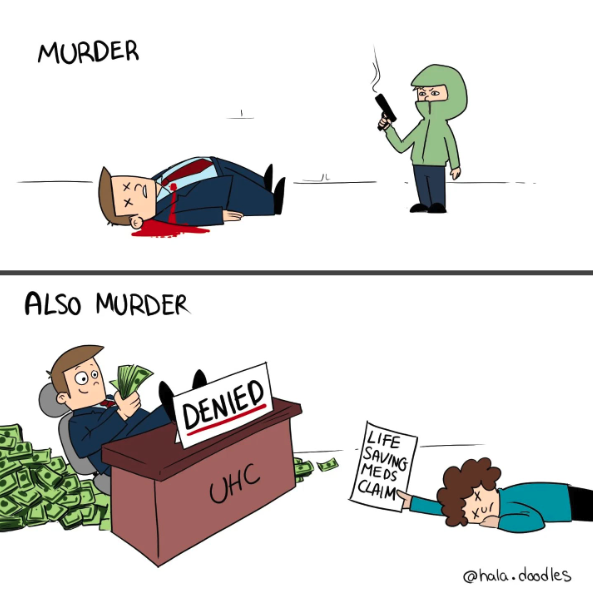During the final days of fall semester, nearly all World History classes watched “Rang De Basanti” — a film about five freedom fighters of the Indian revolutionary movement in the 1930s when India was transforming economically and technologically, but was also marred by corruption. After one of the main characters, “DJ,” loses his friend as a result of corruption, he decides to retaliate by firing a pistol at the Defense Minister of India.
Just two weeks earlier on Dec. 4, America watched a haunting parallel of these events in the news with the shocking murder of UnitedHealthcare’s CEO, Brian Thompson, allegedly as a result of gunshots fired by 26-year-old Luigi Mangione in a targeted attack in Manhattan.
The case sparked widespread attention as investigators worked to uncover the killer and the motives behind the crime. In the weeks after, America erupted in a contentious debate about the virtues of Luigi Mangione’s rationale for the killing. Some even hailed him as a hero rather than a coldblooded murderer for calling attention to the unfairnesses of corporate power over people’s health care outcomes when they are denied coverage they think they are entitled to.
The details behind Mangione’s murder are deep
As an Ivy League graduate and valedictorian of his private high school in Baltimore, Mangione was described by past classmates as an intelligent and kind student. During his time at the University of Pennsylvania as a passionate computer science major, Mangione founded a game development club and went on to receive a bachelor’s and master’s degree in the field.
Roughly six months before Thompson’s murder, Mangione cut off all contact with his family so abruptly and thoroughly that they filed a missing person report. His transformation was appalling even for his friends, who said he had “everything going for him.”
So what led Mangione to isolate himself from his family and later be accused of firing three shots at a well-known executive in Midtown Manhattan?
Hints of this shift in mindset during that half year can be found in his online activity on Goodreads, an online book-reviewing platform. Mangione wrote a review for “Industrial Society and Its Future,” by the infamous “Unabomber” Ted Kaczynski — a man who terrorized the U.S. by mailing and delivering bombs to universities, airlines and other targets from 1978 to 1995. He stated that violence is necessary when other forms of communication fail, revealing a tendency toward extremism in his online presence.
Although Mangione pointed out that Kaczynski was a violent individual who harmed innocent people and was “rightfully imprisoned,” he still makes his belief clear that violence is sometimes the only answer to world issues. Rather than strictly condemning Kaczynski’s actions, Mangione perceived Kaczynski as an extreme, political revolutionary.
Many people have also rationalized Thompson’s murder, asserting that the U.S. healthcare system had proved for too long to be a corrupt and exploitative industry.
Mangione explicitly pointed to the healthcare industry in his murder: Inscribed on the bullet cartridges used in the shooting are the words “delay,” “deny” and “depose,” a phrase used in the “three Ds of insurance” — tactics used by companies to reject payment claims by patients.
Despite spending more on healthcare per capita than other high-income countries, the U.S. does not achieve better health outcomes. For example, among high-income countries, the U.S. continues to have a higher rate of women dying in pregnancy, childbirth or postpartum.
This discrepancy, among others like insufficient regulations, raises concerns about the allocation and management of funds by healthcare providers and insurers. According to the National Library of Medicine, corruption issues such as false reimbursement claims, bribes and financial mismanagement are forms of corruption that cause more than 140,000 global annual deaths of children under 5.
Against this backdrop, many poured expressions of anger toward the healthcare industry, with Americans on social media sharing stories of poor medical experiences.
Anthony Zenkus, a lecturer at the Columbia School of Social Work, captured a public opinion in a post on X: “Today, we mourn the death of UnitedHealthcare CEO Brian Thompson, gunned down… wait, I’m sorry — today we mourn the deaths of the 68,000 Americans who needlessly die each year so that insurance company execs like Brian Thompson can become multimillionaires.”
Zenkus’ post reflects a common theme that emerged: people who feel helpless in the face of enormous medical corporations holding the difference between life or death for them.
Miranda Yaver, assistant professor of health policy and management at the University of Pittsburgh, acknowledges that while “vigilante justice is not justice,” she is still not particularly surprised by the forceful expressions of anger toward the American health insurance system.

Hala.doodles highlights the “murders” the healthcare system has caused, in a political cartoon.
Why is Mangione’s killing glorified?
Former columnist for The Washington Post Tayler Lorenz commented that people rallied around the shooter because he seems like “the only man right now willing to do something about all of it.”
Research finds that justification of violent acts on behalf of social justice traces back decades. To explore concerns that the Muslim world hated America following 9/11, researchers interviewed Arabs on the street in Egypt and Jordan, at random, about their opinions on the terrorist attack. The vast majority and collective response of all these citizens condemned the behavior, thinking it was horrific; however, they admitted that they understood the perpetrators’ motives.
Researchers say this process of the public rationalizing of abhorrent behavior, known as moral disengagement, is caused by several factors. One is that cognitive frustration experienced by individuals becomes overwhelming, and humans are prompted to seek justifications for theirs and others’ actions to alleviate that emotional distress.
As a result of both the exploitation by the healthcare system and Mangione’s murder of the CEO, people like author and inspirational speaker Simon Sinek have taken the current situation to be a kind of “moral rebalancing.”
The concept of ethical fading fittingly describes the actions of the healthcare industry. This process is defined as the ethical aspect of a decision disappearing from consideration. Often happening when people focus heavily on some other aspect of a decision such as profit, the ethical issues can be easily overlooked. Psychologist Ann Tenbrunsel and her colleagues suggested in a 2004 paper that innate psychological tendencies often cause humans to engage in self-deception, which blinds them to the ethical components of a decision.
One aspect of ethical fading lies in the bandwagon fallacy. As the administrators of the healthcare system see many corporations such as Wells Fargo and pharmaceutical companies commit atrocities, they believe they can act the same, by putting monetary gain over saving lives.
Sinek believes that the moral rebalancing exists in the fact that ethics have faded in healthcare — because the healthcare system has harmed citizens, Mangione retaliates and leaves a devastating mark on the healthcare system to create “balance.”
Mangione has gained popularity thanks to his appearance
The online world approached this situation with another perspective, with people making jokes about Mangione’s conventionally attractive appearance. There have been endless incidents of this trend, ranging from comments on Instagram video edits of Mangione to conversations about his looks on The Daily Show. Former Republican congressman Matt Gaetz tweeted that his female friends had been asking if Mangione was single.
As if ignoring the context and the murder victim, some people have even judged Mangione to be completely innocent based solely on his appearance. Jonathan Alpert, a psychotherapist and doctor, asked those who sided with Mangione if they’d have the same opinion of the killer if he was ugly and had tattoos all over his face, to which many were silent and unsure how to respond.
However, associating appearances with character is a fairly typical human response. A 2017 psychological study led by Kay Ritchie, associate professor of cognitive psychology at the British University of Lincoln, reported that people form social judgements partially on impressions of facial attractiveness. Ritchie believes that humans can accurately judge personality traits and physical health from face images.
Psychotherapist and author Dr. Robi Ludwig points out how, from an evolutionary perspective, beauty is associated with “health and well-being,” and since humans are often swayed by looks, the judgement between “who’s good and who’s bad” becomes unclear.
America has a history of glorifying criminals
In American history, Mangione is only one of many murderers who have gained sympathy because of their looks. Serial killers, including the notorious Jeffrey Dahmer, Ted Bundy and Menendez Brothers, have been portrayed by the public with sympathy, instead of condemnation.
Bundy, an American serial killer who kidnapped and murdered dozens of young women, like Mangione, was often romanticized.
Katherine Ramsland, a professor of forensic psychology at DeSales University, attributes the fascination over Bundy to his good looks and charm. Similarly, the Menendez brothers, who were convicted of killing their parents in 1989, have become a sensation in the spotlight also because of appearance and what Forbes describes as the “bad boy effect” — the siblings emanate the allure and aura of danger, rebellion and intrigue, despite having committed patricide.
Perhaps the most compelling similarity shared by all three of these serial killers is the number of true crime shows created about each. A big factor leading to the romanticization of Bundy or Dahmer is that they are played by charismatic actors.
Bundy, when played by the well-liked actor Zac Efron, becomes much more of a sympathetic character. The shows themselves, with content focusing more on the killer than the victim, inevitably portray them in a way that urges sympathy rather than focusing on the brutal acts they have committed.
Evan Peters, who played Jeffrey Dahmer, is an actor many people grew up loving. The dangerous psychology surrounding the casting of “heartthrob” actors as serial killers lies in how, the more attractive people find others, the easier it is to forgive them.
In the end, murder, by its inherent definition, is wrongful killing. While the healthcare industry’s exploitative practices have undoubtedly fueled public outrage, the transformation of such anger and discontent into understanding or even support for murder signals a dangerous erosion of ethical boundaries.
Ultimately, while Mangione’s case and others like it spark important conversations about corruption, justice and human psychology, they also expose a darker side of our collective consciousness — one that risks losing sight of accountability and ethics in the wake of anger, admiration or entertainment.



























